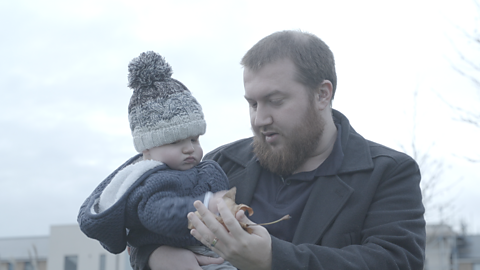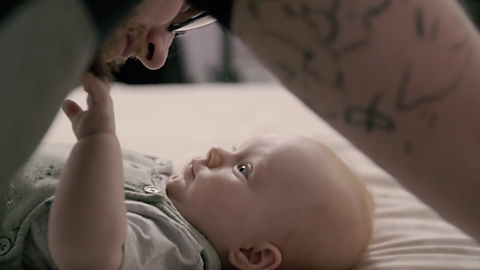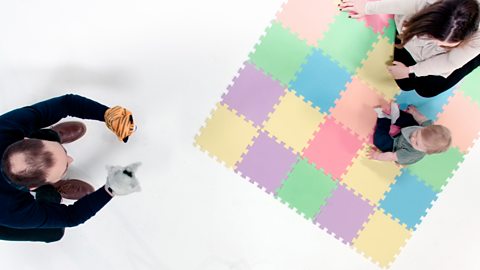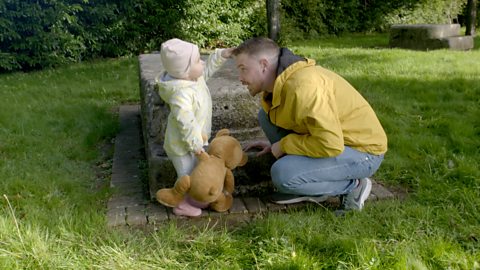In their first six months of life your baby’s eyesight develops rapidly.
At around 3 to 4 months, babies can see anywhere from several feet in front of them to all the way across the room.
This is a really important step in their language development, as well as their physical development.
As their eyesight develops, they'll be able to focus on more things and get to know the world around them.
When they start doing this, follow their lead and talk about all the things that catch their eye.
In the video below, Dr Guddi Singh shares some great tips on how to help develop your baby's listening and focusing skills at 6 months.
Please be aware that some plants can be harmful to babies. If you're unsure which plants are safe for your baby to touch, see your local garden centre or flower shop for advice. If in doubt about anything your baby has come into contact with, seek medical advice from your GP.
Hi, I'm Dr. Guddi Singh, and I'm here to share some tips and ideas about how you can help your baby's language and communication skills.
Today, we're going to learn about how you can support your baby to focus.
Interact with your baby face to face and follow their lead. If your baby goes to touch your face or pull off your glasses, just let them.
Respond positively and call out the parts of the face that they might be touching.
Dad: The beard and the glasses.
Take your baby for a walk and talk about everything that you can see, be close to your baby's face when you're talking to them.
Make sure you describe everything that they're focussing on. This will help them to get used to the world around them.
Next time you're at the bus stop or out and about, follow your baby's lead where their attention is and call out what they're seeing.
This will help them to connect words with images and develop their vocabulary.
Dad: These are leaves, they fall off trees. Hear that crunch.
Talk to your baby about the world around them. Tune into their interests, describe what they see.
This will help improve their attention and help develop their vocabulary.
How is vision linked to language development
Unlike a baby's hearing, their sense of sight develops gradually over their first year of life. Inbetween 8 and 12 months, your baby will see the world almost as well as you do.
While your newborn's eyes are physically capable of seeing just fine at birth, their brain isn't ready to process all that visual information. That's why things stay fuzzy for a while.
As your baby's brain develops and makes new connections, they'll be able to see more clearly and start understanding the world around them.
This is the perfect time to start introducing them to loads of new words, as their brain can start linking what they see with what they hear.
You don't want to overwhelm them though, so check out these three ideas from Dr Guddi that are a good starting point.

Dr Guddi Singh's tips and ideas to help your baby focus
1. Interact with your baby face to face
Even though their eyesight is better than it was, it's still really important to get down to their level and chat to them close up.
Follow their lead. If baby touches your face or wants to play with your glasses, let them (as long as they don't break them).
Respond positively and call out the parts of the face or body that they might be touching.
Find the full one to one activity here.
2. Make your walks and trips language-rich
Take your baby for a walk and talk about everything that you see and are interested in.
Get down close to your baby's face when you're talking to them, if you can. Try to describe everything that they're focussing on.
This will help them get used to the world around them and start linking words with objects.
Find out how a trip to the park is a great language learning opportunity.
3. Tune into your baby's interests
Next time you're out and about, follow your baby's lead and talk about what's caught their attention. Describe what they're seeing.
This will help them to connect words with images and develop their vocabulary.
You can describe different colours, textures, sounds you encounter together, to help develop their sensory awareness around each new word.

Why tuning into your baby's interests is so important
- Why is joint attention such a key tool for learning to talk? We asked the experts.
- We put this to the test in our Speech Lab. Check out what happens in your baby's brain when you tune into their interests.
- Speech and language therapist Cristina explains why joint attention is so great.






